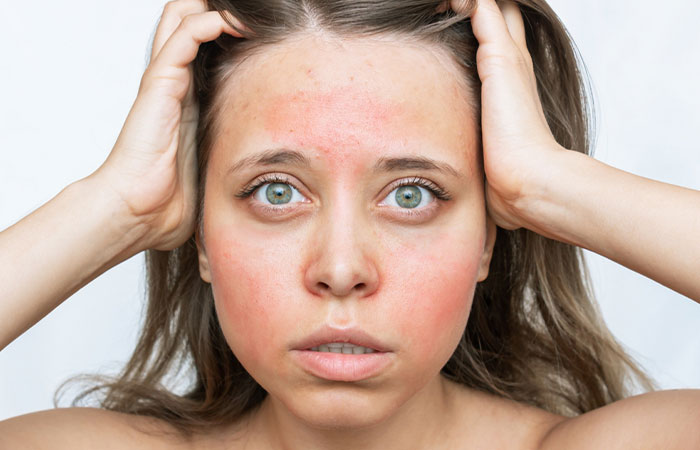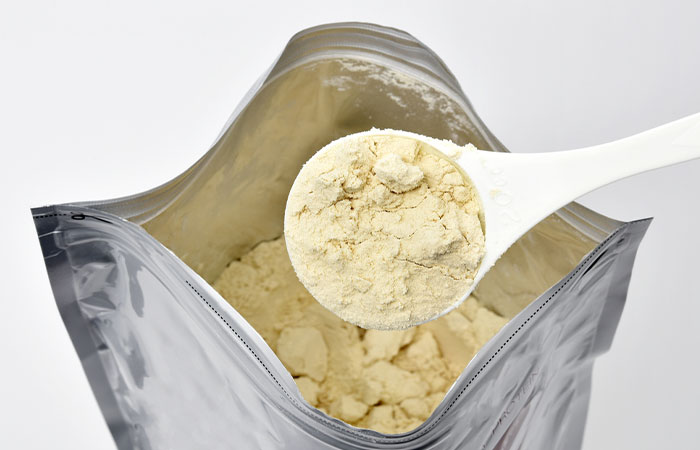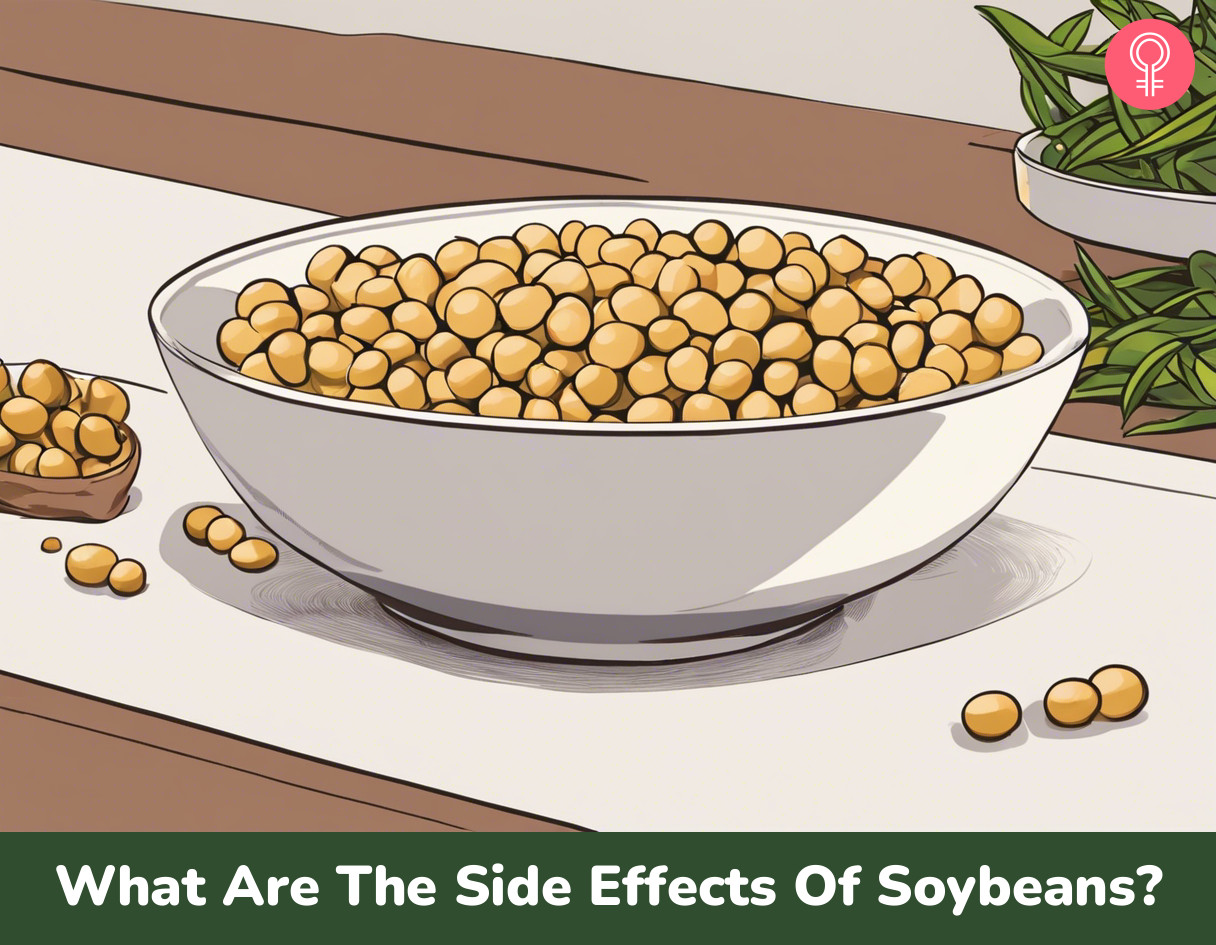Soybeans are abundant in nutrients and are promoted for their multitude of benefits. However, problems about the side effects of soy healthy proteins get on the rise.
These commonly consumed legumes are usually located in lots of refined foods, and their protein is removed from their external shells ( 1 ), ( 2 ). Soybeans are also rich in various vitamins and minerals like calcium, zinc, iron, and amino acids ( 3 ).
Yet when you eat them in excess amounts, their protein content may disrupt thyroid policy, create testosterone imbalance and allergic reactions, and enhance the threat of cancer cells proliferation.
This article further discusses the side effects of soybeans and their proteins in detail. Take a look.
Know The Flip Side: Soybeans
Short-Term Effects
It may cause constipation, stomach ache, or diarrhea.
Long-Term Effects
It may lower sperm concentration and increase the risk of cancer and dementia.
Drug Interactions
It may interfere with anticoagulants and cancer and hypothyroidism medications.
When To See A Doctor
If you experience excessive skin and throat itching, vomiting, wheezing, or diarrhea.
In This Article
What Is The Major Issue With Soybeans?
The major issue with soybeans is its isoflavone content.
Soybeans are reservoirs of phytoestrogens (isoflavones), which are structurally and functionally similar to the estrogen hormone in your body ( 3 ). Isoflavones are a class of phytoestrogens (likewise called soy proteins) found in soy and soy products. The following table ought to give you an idea concerning the isoflavone web content in different soy foods.
| Unfermented soy foods | Isoflavone content (mg) |
|---|---|
| soy milk, 1 cup | 6 |
| tofu (bean curd), soft, 3 ounces | 20 |
| soybeans, mature, boiled, ½ cup | 55 |
| soybeans, dry roasted, 1 oz. | 40 |
| edamame, boiled, ½ cup | 16 |
| soy cheese, 1oz. | 2 |
| soy burger, 1 patty | 5 |
| Fermented soy foods | Isoflavone content (mg) |
| miso, 3 oz. | 37 |
| natto, 3 oz. | 70 |
| tempeh, cooked, 3 oz. | 30 |
| soy sauce, 1 tbsp | 0.02 |
Source: Harvard T.H.Chan School of Public Health
Soy phytoestrogens have been used to compensate for estrogen hormone deficiency. Soy protein is a part of the estrogen replacement therapy given to women who are going through menopause ( 3 ).
Some epidemiological studies recommend that dietary intake of phytoestrogens may decrease the incidence of postmenopausal heart disease, weakening of bones, and warm flashes, among other signs and symptoms. Contrasting data has also reported on the potential of phytoestrogens to prevent cancers of the breast and prostate ( 3 ).
In a cohort study from 2020 involving 52,795 North American females, the replacement of dairy milk with soy milk in the daily diet revealed a minimized danger of breast cancer. No clear organization was found in between soy milk consumption and breast cancer cells independent of milk consumption. Nevertheless, hazard proportions of 1.22 and 1.50 were observed with high intake of milk calories and dairy milk, specifically, which fell to 0.68 after substitution.
TriviaWhile its origination is vague, most botanists claim that soybeans came from China and were domesticated around 7000 BCE.
Nonetheless, the advantages of soy have actually been vague. Actually, particular other researches additionally state that soy healthy protein might create prospective harm ( 3 ). Read on to find out more about the side effects of soy in females.
What Happens When You Consume Soybeans? What Causes The Adverse Effects?
When you eat soybeans (soy protein) in any kind, the soy isoflavones (the phytoestrogens) bind to the estrogen receptors in your body. These phytoestrogens compete with the all-natural estrogen to bind to the receptors. This results in a weak estrogenic or anti-estrogenic task. Simply put, soy isoflavones could make the all-natural estrogen in your body much less effective ( 3 ), ( 4 ).
Such interactions can lead to a hormone discrepancy and trigger gender-related modifications in ladies. They may likewise apply anti-androgenic results in men. Men may start growing breasts (gynecomastia) and experience a dip in their sperm concentration when on a high-soy diet ( 3 ).
Isoflavone overdose over an extended period might promote the endometrium (uterus) and busts in females. Consequently, any person who has actually been treated for breast cancer is normally recommended to stay clear of soy healthy protein ( 3 ).
Phytoestrogens can influence a number of physical and pathological processes in the body. High doses of soy isolates might cause unfavorable impacts on reproduction, skin, bone improvement, cardio system, nerve system, immune system , and metabolism.
Let’s take a look at the adverse effects of soybeans (soy proteins) in detail.
What Are The Adverse Effects Of Soybeans (Soy Protein)?
1. May Interfere With Thyroid Regulation

Soy foods might boost the danger of creating hypothyroidism in people with endangered thyroid function. Such people might develop goiter and autoimmune thyroid condition. This risk further boosts when the person's iodine consumption is reduced ( 5 ).
Soy isoflavones have been found to inhibit the activity of an enzyme called thyroid peroxidase. This enzyme is required for the synthesis of the thyroid hormone. This is why you may face a risk of hypothyroidism when you eat a lot of soy protein ( 6 ).
Soy products also interfere with the absorption of levothyroxine (L-thyroxine), a drug used to treat thyroid hormone deficiency ( 7 ). Since soy healthy proteins appear to modify the availability of the medications, you might be advised against taking in soy protein if you have a thyroid inequality.
Nevertheless, simply a high consumption of soy isoflavones does not appear to increase the danger of hypothyroidism, unless coupled with inadequate intake of nutritional iodine. For that reason, the influence of soy protein on the thyroid gland is open to question. More research is required hereof.
2. May Cause Testosterone Imbalance
A research was conducted on 12 male subjects who took in 56 g of soy protein isolate daily for 4 weeks. As a result, their serum testosterone levels stopped by 19% ( 8 ). Though the data was inconsistent, it was found that soy protein decreased serum testosterone levels in healthy men.
Soy healthy protein is said to have adverse effects on the male reproductive function. However, there are no certain research studies in this regard. Some pet research studies, in fact, state that soy isoflavones do not apply any kind of feminizing effects on males ( 9 ).
Most of the monitorings are based upon laboratory and pet research studies. For this reason, the relationship in between soy isoflavones and testosterone is undetermined ( 10 ).
3. May Elicit Hypersensitivity (Allergy)

Intolerance of soy items can cause allergies or hypersensitivity in children and grownups. Commonly, soy allergic reaction begins in early stage, with reaction to soy-Soy products that can cause allergies or hypersensitivity in youngsters and adults. Frequently, soy allergic reaction starts in early stage with a response to soy-based baby formula. Nonetheless, most kids outgrow soy allergic reaction ( 11 ).
Usually, soy allergy is uneasy however not serious. An allergic reaction to soy is hardly ever frightening or dangerous. other than when it comes to asthma. Signs of soy allergy may include prickling in the mouth, dermatitis or itchy skin, breakouts, wheezing, diarrhea , stomach ache, headache, vomiting, and skin redness (flushing) ( 12 ).
Related: Home Remedies To Reduce Redness On The Face | Prevention Tips
If you experience any one of these signs, you may have a soy allergy. Obtain examined to confirm the allergic reaction. If checked positive, you might be discouraged having soy products/isoflavones.
4. May Increase The Risk Of Cancer Proliferation
Soy isoflavones (among them being genistein) may boost the spreading of cancer cells in your body. This is especially real in the case of estrogen-dependent bust cancer, as soy isoflavones have a tendency to have estrogenic effects ( 13 ).
According to animal research studies, genistein might decontrol the cell cycle and trigger growth advancement. It acts by activating the estrogen receptors ( 14 ).
Contrarily, human studies reveal an inverse relationship between cancer and isoflavones. Soy consumption was likewise discovered to reduce the incidence and fatality rate created as a result of breast cancer cells. This can be due to the anti-estrogenic effect exerted by phytoestrogens ( 13 ).
The amount and source of soy isoflavones also greatly impact breast cancer risk ( 14 ).
5. May Trigger Alzheimer’s Dementia

Traditionally, soy foods were utilized in cooking just after fermenting. This two-step routine would ruin most of the anti-nutrients in soy, such as isoflavones (like genistein and daidzein) and DNA-altering enzymes (like topoisomerases) ( 15 ).
When you consume unfermented, cooked/uncooked soy foods, these anti-nutrients might influence the important systems of your body, including your brain ( 15 ).
These anti-nutrients in soy could have detrimental effects on many individuals. Soy isoflavones could increase the risk of Alzheimer’s dementia ( 15 ).
If you are managing mental deterioration or have a family background of this problem, it is risk-free to decrease your soy usage ( 15 ).
6. May Cause Infant Health Issues

Baby food solutions contain fair quantities of soy protein/isoflavones. Infants who are fed these solutions are exposed to 5.7-- 11.9 mg isoflavones/kg body weight throughout the initial 4 months of life ( 16 ).
These youngsters are revealed to 6-- 11 times greater degrees of isoflavones than adults. This could result in disruptions in the reproductive health and wellness and endocrine feature in the child. The major isoflavones, daidzein and genistein, preferentially bind to the estrogen receptors in the body ( 16 ).
Nonetheless, these verdicts are based upon pet research studies. Human research studies may offer a different photo. Furthermore, currently readily available soy-based solutions show no overt toxicities in healthy and balanced infants ( 16 ), ( 17 ). Hence, check with your pediatrician before giving soy-based formulas to your child.
7. Unsure Osteoprotective Effects
Soy healthy protein has shown to preserve bone mineral density, particularly in postmenopausal ladies. In perimenopausal ladies, the soy isoflavones were revealed to prevent bone loss from the lumbar spinal column. These substances had no substantial result (neither positive nor unfavorable) on bone development and/or bone traction ( 18 ).
In many cases, the mineral equilibrium can be damaged with soy intake. Soybeans contain (by weight) about 1-- 3% phytic acid (also called phytate). Phytic acid is an anti-nutrient that binds to minerals like zinc, iron, and calcium. In addition to soy isoflavones, phytic acid additionally may lower their bioavailability ( 18 ).
However, a major chunk of literary works highlights the osteoprotective result of soy protein. More study is needed to establish the exact impact of soy protein/foods on bone density and other relevant illness ( 19 ).
8. May Cause Weight Gain
Soybeans are a source of calories and essential nutrients ( 20 ). Consuming them in small amounts is not likely to trigger weight gain. However, excess intake of soy-based foods, especially very processed alternatives, can contribute to raised calorie intake, potentially resulting in weight gain. An animal research located that excess amounts of soy isoflavones might raise body weight and fat percent ( 21 ). However, more human studies are needed in this regard.
It is essential to remember that each person's metabolism and feedback to various foods can differ. Some individuals may integrate soybeans into their diet regimen without gaining weight, while others may require to be conscious of their part sizes and general calorie consumption. Consult a signed up dietitian for the appropriate section dimension for you.
The majority of the research study on soybeans and soy protein is still uncertain. While in some researches they appear to advertise health, certain various other researches tend to mention the prospective injury they might trigger. Nevertheless, this does not suggest you need to totally be off soy. There are a few certain soy items you might want to prevent.
Which Soy Products Should You Avoid?

Small amounts is essential, and so is eating right. Picking the appropriate kind of soy products can safeguard you from the unfavorable effects stated above.
When provided an option between natural soy foods and soy healthy protein isolate, opt for the natural options. Prevent commercial soy foods if you have iodine deficiency or thyroid imbalance ( 15 ).
Entire soy foods are primarily fermented and cooked in a much healthier way. You can take tofu, edamame, soy milk, tempeh, miso, and natto a couple of times each week.
Fun FactBy the 17th century, British colonists brought soybeans to Georgia, a British colony.
How Much Soy Is Safe To Eat In A Day?
According to the United States FDA, day-to-day usage of 25 g of soy seems to be safe. This quantity of soy could also aid lower cholesterol levels ( 22 ).
It likewise is believed that the intake of 50 g of soy protein daily can assist prevent cardiovascular disease, diabetes, and estrogen-dependent cancers. Nevertheless, even more research is required.
Related: Easy Ways To Manage Blood Sugar Naturally And Safely
There is limited details on the excess intake of soy protein/soybeans. However we do not advise you take greater than 25 grams per day.
Is Eating Too Much Soy Harmful?
There is little information concerning the poisoning of soy healthy protein. In restricted doses, soy healthy protein might be practical for ladies who go to a high danger of bust cancer cells ( 23 ).
Some researches reported very couple of drug-related negative events, which were mild. In extremely couple of instances, high levels of soy isoflavones adversely impacted high blood pressure levels ( 24 ).
Related: 13 Simple & Natural Ways To Lower Your Blood Pressure At Home
Hence, it is important you talk to your healthcare provider about a suitable dosage for you.
Infographic: Top 5 Side Effects Of Soybeans
Soybeans are a storehouse of powerful nutrients that use a huge selection of health and wellness benefits. Nonetheless, excess intake might create an allergy or problems in babies. Look into the infographic listed below for the leading 5 adverse effects of soybeans you should learn about in the past including them in your diet.
Illustration: StyleCraze Design Team
Get the high-quality PDF version of this infographic.
Soy healthy protein side effects are attributed particularly to soy isoflavones, which render natural estrogen task in the body much less reliable, leading to hormone imbalance. Soy foods may likewise boost the danger of hypothyroidism, especially if the iodine consumption is reduced. Additionally, some individuals, consisting of babies, may be allergic to soy foods and may experience scratchy skin, diarrhea, vomiting, stomach ache, etc. So, prevent consuming them when you experience these signs and symptoms. In addition, soy isoflavones are said to assist in the multiplication of cancer cells and enhance cancer threat. Thus, it is encouraged to take in soy in advised does.
Frequently Asked Questions
Which protein is better – soy or whey?
It depends on your personal choice. Both proteins revealed no substantial differences in muscular tissue development. Nevertheless, whey healthy protein may have a slight edge as a result of its a little greater leucine material ( 25 ).
Does soy cause gas and bloating?
Yes, usage of soy items might lead to extreme digestive gas. Legumes have high degrees of the indigestible oligosaccharides raffinose and stachyose, which are fermented in the colon by bacteria ( 26 ).
Can soy cause sinus problems?
Possibly. If you are sensitive or allergic to soy, you may face sinus problems.
Is soy protein hard to digest?
It varies from private to specific. For some people, it may create acid indigestion, and they may experience gas, bloating, nausea, stomach pains, or pain.
Key Takeaways
- Soy products may affect the synthesis of essential hormones like thyroid and testosterone.
- Consuming soybean-based foods may cause allergic reactions with symptoms like itchy skin, diarrhea, and vomiting.
- Unfermented soy foods may affect the brain and increase the risk of dementia.
- Instant food formulas with soy protein may also affect reproductive health and endocrine function in children.
- Daily consumption of 25g of soy is considered safe by US FDA.
Check out just how soy can damage your body and the hidden risks it poses. Have a look at the video clip below to learn about the feasible negative effects related to soy and how to prevent them.




